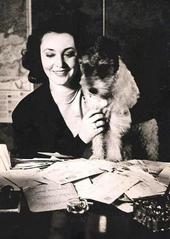She was born Sara Stina Hedberg in Karlstad and died in Stockholm. Although Zarah Leander studied piano and violin already as a small child, and sang on stage for the first time at the age of six, she made a serious attempt at an ordinary life. As a teenager she lived two years in Riga (1922–1924), learned the then most important international language, German, took up work as a secretary, married Nils Leander (1926), and had two children (1927 & 1929). However, in 1929 she was engaged, as an amateur, in a touring cabaret by the leading entertainer and producer Ernst Rolf and for the first time sang "Vill ni se en stjärna," ('Do you want to see a star?') which soon would become her signature tune.In 1930, she participated in four cabarets in the capital, Stockholm, made her first records, including a cover of Marlene Dietrich's "Falling in Love Again," and played a part in a film. However, it was as Hanna Glavari in Franz Lehár's operetta The Merry Widow that she had her definitive break-through (1931). By then she had divorced Nils Leander. In the following years, she embarked on a splendid career and could make a decent living as a popular artist on stage and in film in Scandinavia. Her fame brought her proposals also from the European continent and from Hollywood, where a number of Swedish actors and directors were working.Zarah Leander opted for an international career on the European continent. As a mother of two school-age children, she ruled out a move to America. In her view it was, most of all, too insecure. She feared the consequences, should she bring the children with her such a great distance and subsequently be unable to find employment. Despite the political situation, Austria and Germany were much closer, and Leander was already well-versed in German.A second breakthrough, by contemporary measures her international debut, was the world premiere (1936) of Axel an der Himmelstür at the Theater an der Wien in Vienna, directed by Max Hansen. It was a parody on Hollywood and not the least a parody of the German Marlene Dietrich, who had fled a Europe marked by Mussolini's, Stalin's and Hitler's stars. It was followed by the Austrian film Premiere, in which she played the role of a successful cabaret star.Read more att the Wikipedia and www.zarahleander.blogg.se (all in swedish). WELCOME!
//janne
Smile and maybe somebody smiles back!
